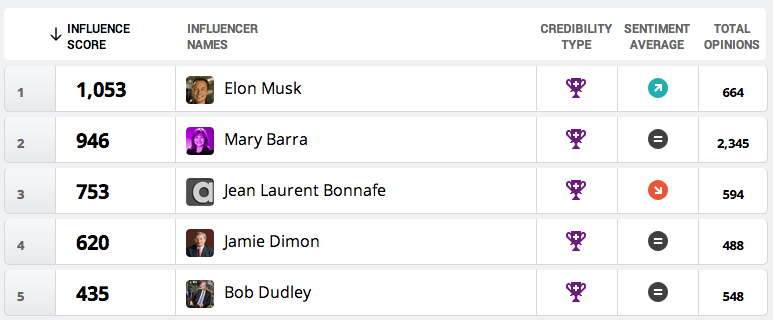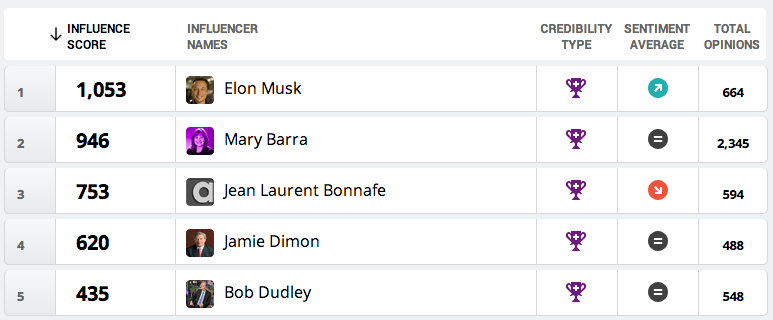As executive influence becomes more important, C-suite executives really do need to “be their brand.” To that end, being seen as an influential thought leader or opinion maker is vital for any CXO hoping to lead a competitive company in today’s world.
But how do you do that? We decided to look at people who are doing it successfully today, and reverse-engineer their secrets. We identified 7 important habits, the first 4 of which we’ll cover in today’s article. They are:
- Own A Topic
- Make The Most of Controversy
- Corollary – Don’t Work in Finance
- Tweet Early, Tweet Often aka Publish or Perish
- Know Your Audience
- Be More Than A Brand Extension
- Make Yourself Accessible
So let’s see exactly who these influential leaders are.
Executives Who Lead
To begin, we used the Rock Content Insights influence management platform to identify and rank business executives who are viewed as “thought leaders”. We looked for people who had been identified as Founders, CEOs, CMOs, COOs, CTOs, CIOs, etc., and also included terms such as “thought leader,” “visionary,” “genius,” and others.
The result is a “Most Influential Executives” list that has some leaders you’d expect, and some that aren’t yet quite household names.
The top 10 are:
- Elon Musk: Founder, CEO, CTO – SpaceX; Founder, CEO – Tesla
- Mary Barra: CEO – General Motors
- Jean-Laurent Bonnafe: CEO – BNP Paribas
- Jamie Dimon: CEO – JPMorgan Chase
- Bob Dudley: CEO – BP
- Dov Charney: Founder, CEO – American Apparel
- Richard Gonzalez: CEO – AbbVie
- Chet Kanojia: Founder, CEO – Aereo
- Jeffery Immelt: CEO – General Electric
- Omar Ishrak: CEO – Medtronic
Slightly trailing down the list are a number of other well-known execs: leaders at AT&T, Apple, Blackberry, Amazon and more. So how did these leaders earn their influence?
1. Own A Topic
Rock Content Insights has found that influence is inherently specific to an individual topic. As an example, you might think that one person’s recommendations about technology are worth considering, while you’d never listen to their restaurant reviews. For executives we’ve found that it’s most effective to stick to one or two key topics and builds influence around that; once you are influential in one topic, you can expand out from there, but it’s important to not get ahead of oneself as you get started. Tweeting haphazardly about dozens of topics may be fun, and showing off some personality is important, but there’s a risk of going too far and putting off or confusing your would-be followers.

(Source: Wikipedia)
Of course, each exec should choose a topic where they have genuine expertise and insight to add, and that is clearly related to his or her company’s field. That said, you’ll grow your audience by making sure your topic isn’t 100% focused on just your company or that you’re not simply acting as a PR mouthpiece, shooting out links to your latest press release. Rather, use your expertise in your company’s field to serve as a lens for a slightly broader topic and make sure you’re really educating your readers with information they would not otherwise come across.
Jeff Bezos of Amazon is a great example. As the Founder and CEO, he’s shown that he’s an extremely long-term planner; Amazon is famous for eschewing meaningful profits for years, all in the name of its long-term march towards dominating all forms of retail. But Bezos also applies that very strategic, profitability-be-damned thinking to a number of other ventures: he’s purchased the Washington Post and become known in the art world for his 10,000 year clock, which will only move once a century. Now his tenaciousness has even been recognized by the US government, who he’s consulting on recent plans to return humans to space.
Our data shows executives speak about an amazing array of themes and topics:
Let this be a lesson – there is no one right topic. Pick something you know about and start contributing to the conversation today.
2. Make The Most of Controversy
Sometimes you work hard to earn influence, and sometimes it comes to you – and not necessarily for the reason you’d hope. When something goes wrong at a company, their executives are at the forefront of that controversy. This is well exemplified by Mary Barra, the CEO of General Motors.
![[Rock NA] State of Marketing Reports 2024 – Comkt Hubspot State of Marketing Report 2024](https://rockcontent.com/wp-content/uploads/2022/07/Banner-Fino-Rock-Convert-2500-×-500-px-19.png)
 Mary Barra, CEO of GM.
Mary Barra, CEO of GM.
While she’s been a newsmaker for the entirety of her tenure as GM’s leader, her influence really spiked once GM’s massive recalls got everyone talking – from harried journalists down to worried customers on twitter. The beauty of this is that she’s managed to capitalize on the press, rising above the storm, and hopefully eventually leading her company to do the same.
She’s owned up to GM’s mistakes, and is emerging as a voice of reform in a stodgy industry. By showing that she’s not afraid to fire wrongdoers, make public her company’s big internal changes, and highlight a path forward, Barra is emerging as a respected thought leader on automotive safety. Already, the tides are shifting and Barra is being recognized as a leader.
Other CEOs took controversy in stride as well. American Apparel founder Dov Charney is currently battling his company over who will lead them in the future; by getting his name and his side of the story out in public, Charney has assured that no matter what his next move is, people will be watching. The approach already seems to be paying dividends – much of the discussion about him has now moved on to his redeeming qualities and whether he’ll be able to wrestle back control of the company.
3. Corollary – Don’t Work in Finance
Or do, but expect to have an uphill battle against negative sentiment. While a number of top banking and finance executives topped our chart, they were mostly on the defensive side of things: backpedaling and defending their (and their company’s) actions against a world angry about their perceived excesses.

That said, when life gives you influential lemons, you can sell an awful lot of lemonade. Despite public opinion, these finance leaders haven’t slowed down – continuing to speak out for in ways that help their companies. Jenkins, a ruthless cost cutter, has gotten known as an advocate for automation in the workplace. His view are already resonating outside of the business sphere, with publications like Computer World quoting him on the topic.
So while the public might not agree with bankers, they definitely appear to be paying attention.
4. Tweet Early, Tweet Often aka Publish or Perish
It’s hard to build a following if a decade seems to pass between your prognostications. Our top influencers showed a proclivity for getting their name out in the news, whether in their own writing, or in giving quotes to journalists, or simply by doing things that guaranteed their names would be in the media.
Take a look at Elon Musk’s opinion volume chart, above. As you can see, he’s consistently part of the conversation, weighing in on all sorts of transportation topics: space ships, electric cars, even hyperloops! He’s making sure that he and his companies are being talked about, and if they aren’t, he goes and makes his own news (see – releasing patents to the public.)
Now look at Mark Zuckerberg. While a household name, he’s not exactly a big talker. Famously shy, he tends to keep himself out of the news, and he suffers for that – he’s only number 54 on our list. Because of this, when he does have to talk, he’s usually on the defensive side – apologizing for some privacy lapse at Facebook or seemingly making excuses about an ill-received feature change.
Imagine how much better off Zuckerberg could be if he got ahead of the news. If he were a more active blogger, or was consistently writing a column for a major news or tech publisher (and they’d all be happy to have him), Zuckerberg could be perceived as a thought leader on the future of privacy, and not simply the scapegoat / stereotype the media trots out whenever they need to talk about the erosion of privacy.
Know Your Audience, Be More Than A Brand Extension, & Make Yourself Accessible
With those first four rules, you’re already off to a powerful start. Next week we’ll analyze the other 3 factors that drive executive influence, as well as give you some actionable next steps to start applying these yourself.











